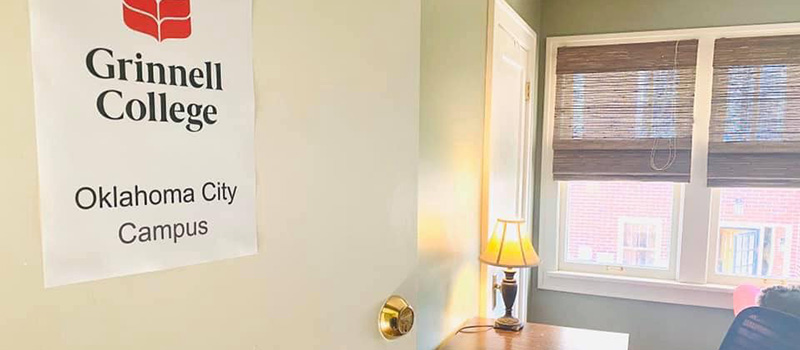What role can parents play in preparing their students for distance learning?
March 31, 2020 — Many parents and family members of Grinnell College students are comforted to have their student back home during this anxiety-filled time.
With the spring semesters resuming through online classes on March 30, there naturally have been questions about what distance learning will be like, and how parents and family members can attempt to set their students up for academic success.
“Most Grinnell students have never been online students before,” says Joyce Stern, the College’s dean for student success and academic advising. “We are just beginning to learn how different of an experience this will be for our students. And while they are ‘experts’ at being a Grinnell student, learning from a distance will feel different, and they may feel trepidation about any number of things. Ask them how they are transitioning. What feels familiar? What is completely different? What is working well? What is frustrating?”
 Parents and family members of Grinnell College students are putting up hometown campus signs in their homes around the world. Make your own sign using this template.
Parents and family members of Grinnell College students are putting up hometown campus signs in their homes around the world. Make your own sign using this template.
While the following tips from Stern and other academic specialists likely aren’t one-size-fits-all, many could apply to situations Grinnell parents and families could be facing in the coming weeks. Additional resources can be found at #GrinnelliansStayConnected, an initiative driven by students, faculty, and staff to provide ways for Grinnellians to stay connected and collectively care for ourselves and one another.
- Grinnell coursework requires a significant time commitment. Many students will still be carrying a full course load, and we are entering one of the busiest times of the academic year. Depending on time zone, online class or study meetings may occur during a usual meal time or other family activity. Students may not be able to supervise younger siblings all day. That’s not to say they can’t help with things around the house. But make sure that you are making requests when they are truly available and respect their schedule.
- Speaking of which, suggest that your student set up regular work hours. Most students (and all of us frankly) will likely benefit from structure and routine in their day. It may be these work hours are late at night, which is not uncommon for when study groups meet or when homework/studying gets done on campus.
- Realize the stress level is high right now. Beyond the usual stress associated with final projects and papers, many students will be navigating (potentially several) new online systems, which in itself could be stressful. Add to that the displacement of normal routines and social interactions, plus worrying about the potential impacts of the coronavirus, and it’s easy to see how anxiety could become off the charts. Family support and exercise could be beneficial. Also know that Grinnell’s Student Health and Wellness (SHAW) Counseling Services can help connect students with mental health resources 24 hours a day.
- Grinnell’s Academic Advising office wants to help if a student is experiencing new academic challenges, if they are dealing with personal or health-related issues that are making it difficult to get their work done, or if they are wondering about policies that might help with flexibility. In short, any academic concern can be brought up.
- If parents are working from home as well, share some tips and some frustrations. Ask your student for suggestions. You’re in the same situation and can help each other out.
- To the best of your ability, make sure students have the resources they need to be successful. This could mean their own designated work space or having notebooks, pens, or other supplies on hand. If there’s not an internet connection in the home, check with Grinnell’s Financial Aid office about getting a mobile hotspot. If textbooks didn’t arrive home, many publishers are providing free e-book access during the pandemic.
- Make sure students know how the College is setting up this new online learning format. This information is still fluid as of this writing, but professors will share information soon about lectures, discussion boards, tests, etc. Encourage students to reach out to their professors if they have questions about the format (in addition to course content). Take advantage of faculty members’ office hours. Faculty will still be available by email, phone, and possibly Webex (Grinnell’s teleconferencing platform). Keep in mind this style of teaching is new for many professors as well.
- Recognize that this is a big adjustment and transition for all of you. Some students are thrilled to be home and to move to an online environment and others are worried that they won’t be able to succeed this way. Listen, be as reassuring as you can, and direct them back to Grinnell for assistance. We are still here to support them.
—by Jeremy Shapiro